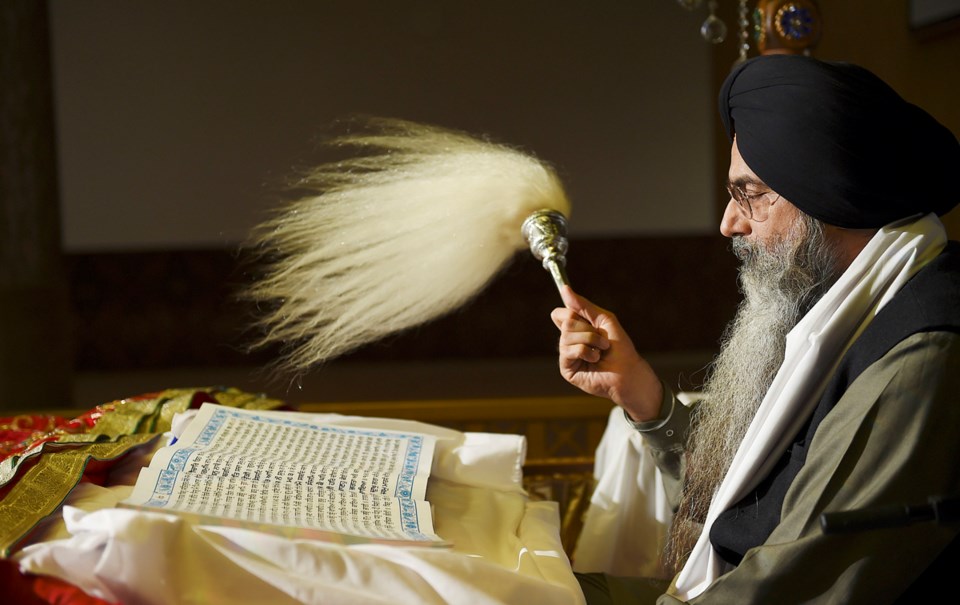On Tuesday, Sikhs in Vancouver and around the world will mark a profound day in the history of their religion — and a fascinating, unique way of relating to the divine.
Beginning in the 15th century, religious leadership of the Sikh faith had been passed down across 10 gurus who refined and interpreted the revelations that form the core of Sikh theology. When it came time for the 10th guru, Guru Gobind Singh, to name a successor, he did not appoint another human. He declared that the Sikh Holy Scripture, the Adi Granth, would become the 11th and final guru, an everlasting embodiment of Sikh wisdom and guidance for life. Thereafter known as Guru Granth Sahib, the 1,430-page volume is the final, definitive statement of the Sikh religion and is considered the 11th and final guru in the line dating back half a millennium.
“It was the 10th guru who told us that we should believe Guru Granth Sahib, our holy scripture, as a living guru, the embodiment of guru,” says Harminder Pal Singh, head granthi (“reader” or priest) at the Ross Street Temple in South Vancouver. “There are no more living gurus.”
The first in that line was Guru Nanak (1469 – 1539), who rejected the authority of the Vedic scriptures that form the foundation of Hinduism, condemned the caste system, declared the equality of all people, in particular women, and, in the process, founded Sikhism.
He also set out the basis for what would become the Guru Granth Sahib.
In 1604, Guru Arjan, the fifth guru, assembled the writings of the previous gurus, the various Sikh hymns and writings from other sainted Sikhs into a single volume.
He built the Harmandir Sahib, the Golden Temple, at Amritsar and installed the Adi Granth as its centre.
The commemoration of this event is celebrated annually on Sept. 1, says Singh, the marking of the creation of the Adi Granth as the sole, central scripture in the religion. On Tuesday, Sikhs mark the day 104 years later, when the scripture was revised and elevated to the status of guru.
On Tuesday, Oct. 20, Singh and the approximately 200,000 Sikhs in B.C. will reflect on the meaning of the book.
“The central message, in my opinion, is God is one, the universal God, a formless God, it’s a fearless God, it’s self-existent,” he says. “The message is you work hard and share your hard-earned earnings among the needy people. This is the central message, I feel.”
Humility, tranquillity, peace, high moral standards and human co-existence are at the heart of the book’s lessons. The unequivocal equality of women was a stunning and revolutionary idea at the time and stands out as definitive of Guru Granth and Sikhism. Control of the “five vices” (Pride/Ego, Anger/Temper, Greed/Urges, Attachment/Dependency and Lust/Addiction) forms the moral basis of Sikh behaviour.
The book itself is given the royal treatment. In the temple, it is placed on a throne-like alter and fanned with an implement reminiscent of the peacock feather fans that once cooled royalty. Interestingly — and perhaps in keeping with the Sikh dedication to equality of all — there is no concept of a sacred language. Guru Granth has been translated into many languages and each version is considered equal.
Though Tuesday is an important day in the Sikh calendar, the commemorations at the gurdwaras, the temples, will not stand out greatly from other holy days.
“Every Sikh ceremony is celebrated in the same way,” says Singh. In India, on this day, most cities, towns and villages with a Sikh population will have a parade. In Vancouver, Sikhs have a parade on Vaisakhi instead. Tuesday’s services will take place inside the temple.
“We sing hymns and we read our scripture uninterrupted,” he says. “People gather in the congregation in a big way and they sing hymns.”
For the priest, Guru Granth is the core of his moral and theological life.
“It means for me that I should not go anywhere else to find some living guru,” he says. “This is our guru. This scripture will guide me. There is no other scripture we believe in.”
While the day may be marked in India with public outpourings of devotion, in Vancouver it will be less visible to non-Sikhs. However, Singh stresses, Guru Granth is not solely a book for Sikhs.
“The message written in Guru Granth Sahib is not meant only for Sikhs,” he says. “This is a universal message. This is a way of life.”
PacificSpiritPJ@gmail.com
@Pat604Johnson



